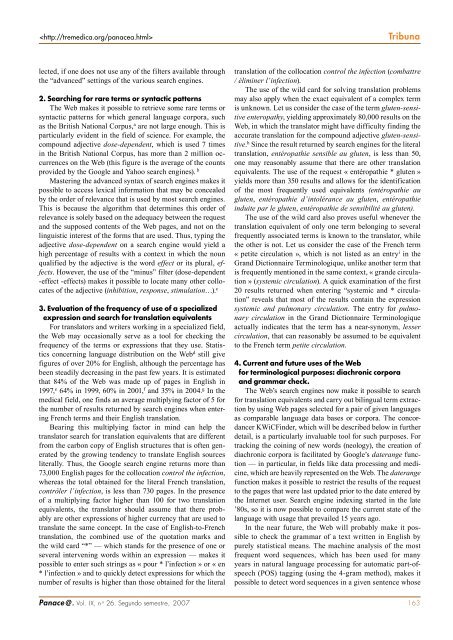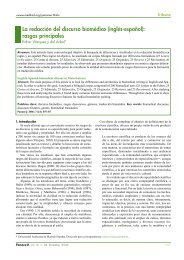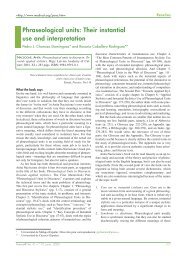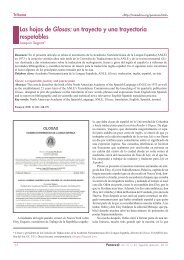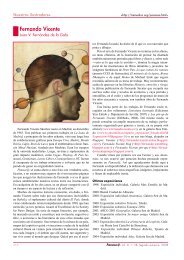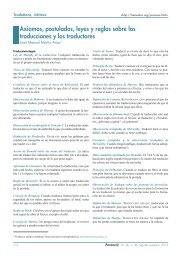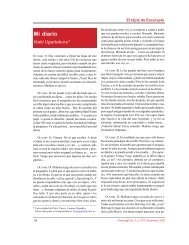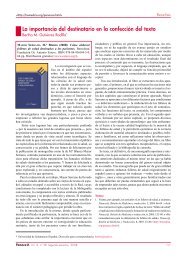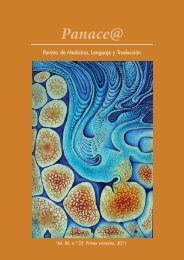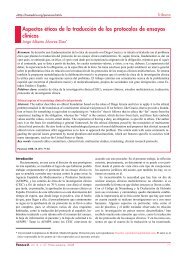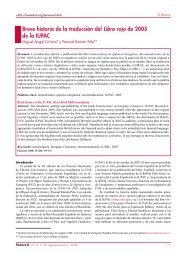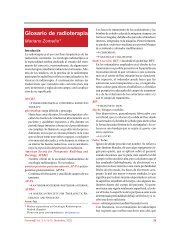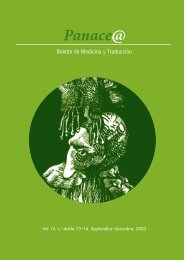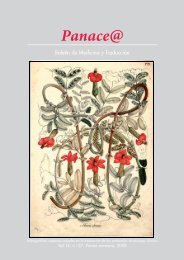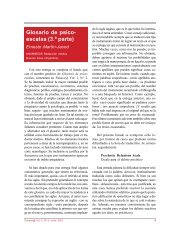Panace@ 26. Diciembre del 2007 - Tremédica
Panace@ 26. Diciembre del 2007 - Tremédica
Panace@ 26. Diciembre del 2007 - Tremédica
You also want an ePaper? Increase the reach of your titles
YUMPU automatically turns print PDFs into web optimized ePapers that Google loves.
Tribuna<br />
lected, if one does not use any of the filters available through<br />
the “advanced” settings of the various search engines.<br />
2. Searching for rare terms or syntactic patterns<br />
The Web makes it possible to retrieve some rare terms or<br />
syntactic patterns for which general language corpora, such<br />
as the British National Corpus, a are not large enough. This is<br />
particularly evident in the field of science. For example, the<br />
compound adjective dose-dependent, which is used 7 times<br />
in the British National Corpus, has more than 2 million occurrences<br />
on the Web (this figure is the average of the counts<br />
provided by the Google and Yahoo search engines). b<br />
Mastering the advanced syntax of search engines makes it<br />
possible to access lexical information that may be concealed<br />
by the order of relevance that is used by most search engines.<br />
This is because the algorithm that determines this order of<br />
relevance is solely based on the adequacy between the request<br />
and the supposed contents of the Web pages, and not on the<br />
linguistic interest of the forms that are used. Thus, typing the<br />
adjective dose-dependent on a search engine would yield a<br />
high percentage of results with a context in which the noun<br />
qualified by the adjective is the word effect or its plural, effects.<br />
However, the use of the “minus” filter (dose-dependent<br />
-effect -effects) makes it possible to locate many other collocates<br />
of the adjective (inhibition, response, stimulation…). c<br />
3. Evaluation of the frequency of use of a specialized<br />
expression and search for translation equivalents<br />
For translators and writers working in a specialized field,<br />
the Web may occasionally serve as a tool for checking the<br />
frequency of the terms or expressions that they use. Statistics<br />
concerning language distribution on the Web d still give<br />
figures of over 20% for English, although the percentage has<br />
been steadily decreasing in the past few years. It is estimated<br />
that 84% of the Web was made up of pages in English in<br />
1997, e 64% in 1999, 60% in 2001, f and 35% in 2004. g In the<br />
medical field, one finds an average multiplying factor of 5 for<br />
the number of results returned by search engines when entering<br />
French terms and their English translation.<br />
Bearing this multiplying factor in mind can help the<br />
translator search for translation equivalents that are different<br />
from the carbon copy of English structures that is often generated<br />
by the growing tendency to translate English sources<br />
literally. Thus, the Google search engine returns more than<br />
73,000 English pages for the collocation control the infection,<br />
whereas the total obtained for the literal French translation,<br />
contrôler l’infection, is less than 730 pages. In the presence<br />
of a multiplying factor higher than 100 for two translation<br />
equivalents, the translator should assume that there probably<br />
are other expressions of higher currency that are used to<br />
translate the same concept. In the case of English-to-French<br />
translation, the combined use of the quotation marks and<br />
the wild card “*” — which stands for the presence of one or<br />
several intervening words within an expression — makes it<br />
possible to enter such strings as « pour * l’infection » or « en<br />
* l’infection » and to quickly detect expressions for which the<br />
number of results is higher than those obtained for the literal<br />
translation of the collocation control the infection (combattre<br />
/ éliminer l’infection).<br />
The use of the wild card for solving translation problems<br />
may also apply when the exact equivalent of a complex term<br />
is unknown. Let us consider the case of the term gluten-sensitive<br />
enteropathy, yielding approximately 80,000 results on the<br />
Web, in which the translator might have difficulty finding the<br />
accurate translation for the compound adjective gluten-sensitive.<br />
h Since the result returned by search engines for the literal<br />
translation, entéropathie sensible au gluten, is less than 50,<br />
one may reasonably assume that there are other translation<br />
equivalents. The use of the request « entéropathie * gluten »<br />
yields more than 350 results and allows for the identification<br />
of the most frequently used equivalents (entéropathie au<br />
gluten, entéropathie d’intolérance au gluten, entéropathie<br />
induite par le gluten, entéropathie de sensibilité au gluten).<br />
The use of the wild card also proves useful whenever the<br />
translation equivalent of only one term belonging to several<br />
frequently associated terms is known to the translator, while<br />
the other is not. Let us consider the case of the French term<br />
« petite circulation », which is not listed as an entry i in the<br />
Grand Dictionnaire Terminologique, unlike another term that<br />
is frequently mentioned in the same context, « grande circulation<br />
» (systemic circulation). A quick examination of the first<br />
20 results returned when entering “systemic and * circulation”<br />
reveals that most of the results contain the expression<br />
systemic and pulmonary circulation. The entry for pulmonary<br />
circulation in the Grand Dictionnaire Terminologique<br />
actually indicates that the term has a near-synonym, lesser<br />
circulation, that can reasonably be assumed to be equivalent<br />
to the French term petite circulation.<br />
4. Current and future uses of the Web<br />
for terminological purposes: diachronic corpora<br />
and grammar check.<br />
The Web’s search engines now make it possible to search<br />
for translation equivalents and carry out bilingual term extraction<br />
by using Web pages selected for a pair of given languages<br />
as comparable language data bases or corpora. The concordancer<br />
KWiCFinder, which will be described below in further<br />
detail, is a particularly invaluable tool for such purposes. For<br />
tracking the coining of new words (neology), the creation of<br />
diachronic corpora is facilitated by Google’s daterange function<br />
— in particular, in fields like data processing and medicine,<br />
which are heavily represented on the Web. The daterange<br />
function makes it possible to restrict the results of the request<br />
to the pages that were last updated prior to the date entered by<br />
the Internet user. Search engine indexing started in the late<br />
’80s, so it is now possible to compare the current state of the<br />
language with usage that prevailed 15 years ago.<br />
In the near future, the Web will probably make it possible<br />
to check the grammar of a text written in English by<br />
purely statistical means. The machine analysis of the most<br />
frequent word sequences, which has been used for many<br />
years in natural language processing for automatic part-ofspeech<br />
(POS) tagging (using the 4-gram method), makes it<br />
possible to detect word sequences in a given sentence whose<br />
<strong>Panace@</strong>. Vol. IX, n .o <strong>26.</strong> Segundo semestre, <strong>2007</strong> 163


